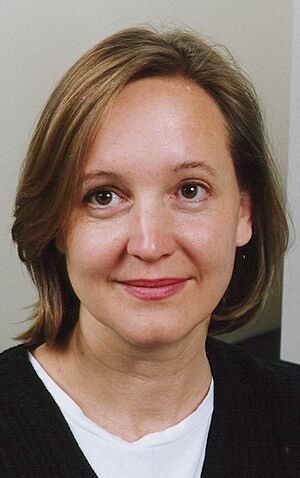Debra Fischer facts for kids
Quick facts for kids
Debra Ann Fischer
|
|
|---|---|

Fischer in 2004
|
|
| Born | 1953 |
| Alma mater | University of Iowa, San Francisco State University, University of California at Santa Cruz |
| Known for | Astronomy, Exoplanetology |
| Scientific career | |
| Fields | Astronomy |
| Institutions | Yale University |
Debra Ann Fischer is a famous American astronomer. She teaches astronomy at Yale University. Her main work is finding and studying planets outside our solar system, called exoplanets. She has found hundreds of these planets! She was even part of the team that found the first system with more than one planet orbiting another star.
Contents
Her Early Life and Education
Debra Ann Fischer was born in 1953. She first studied nursing at the University of Iowa, earning her degree in 1975. Later, she decided to study science.
She received a master's degree in physics from San Francisco State University in 1992. Then, she earned her PhD in astrophysics from the University of California at Santa Cruz in 1998. Astrophysics is the study of the physics of the universe.
Discovering New Worlds: Exoplanets
Dr. Fischer has written over 300 papers about dwarf stars and exoplanets. She helped show how the chemical makeup of a star can affect the giant planets that form around it.
She led a group called the N2K Consortium. This group found many exoplanets orbiting stars that have a lot of "metals" (elements heavier than hydrogen and helium). They used powerful telescopes like the Keck Observatory.
One of her big achievements was finding the first known system with multiple planets in 1999. This discovery helped scientists understand how planets form around other stars.
Helping Scientists Find Planets
Dr. Fischer has also worked on creating better tools to find exoplanets. In 2011, she started a project called the Fiber-optic Improved Next-generation Doppler Search for Exo-Earths. This project helped scientists find smaller, more Earth-like planets.
She also worked on a special tool called a microcomb. This tool helps make very precise measurements of light from stars. These measurements are important for finding tiny wobbles in a star's movement, which can mean a planet is orbiting it.
Dr. Fischer was also in charge of building three special instruments called spectrographs. These tools help break down starlight to learn about stars and the planets around them.
She and her team have also improved how scientists analyze data. They use advanced math and computer methods to find even very small planets. From 2021 to 2023, Dr. Fischer worked as a director at the National Science Foundation.
Citizen Science: Planet Hunters
Dr. Fischer helped create a cool project called Planet Hunters. This project lets everyday people help scientists look for new planets! It's part of the Oxford Zooniverse team.
The Planet Hunters project is online at planethunters.org. It was inspired by the Kepler Project, which was a space telescope mission. Thanks to many people helping, the Planet Hunters project has been very successful in finding new planets.
Awards and Recognition
Dr. Debra Ann Fischer has received many honors for her amazing work in astronomy:
- 1993: Graduate Student Fellowship, NSF
- 1994: Marilyn C. Davis Scholarship, UCSC
- 1997: California Space Grant, NASA
- 2002: Carl Sagan Award, American Astronautical Society
- 2004: Benjamin Dean Lecturer, California Academy of Science
- 2004: Professional Astronomer for the Communication of Science, Amateur Astronomer Society of Northern California
- 2005-2007: Cottrell Science Scholar
- 2009: Radcliffe Institute Fellow
- 2010: Connecticut Academy of Science and Engineering
- 2012: Elected Member of the American Academy of Arts and Sciences
- 2016: Hall of Fame Inductee at San Francisco State University
- 2020: Elected a Legacy Fellow of the American Astronomical Society
- 2021: Class of Fellows of the American Association for the Advancement of Science
- 2021: Elected Member of the National Academy of Sciences
See also
 In Spanish: Debra Fischer para niños
In Spanish: Debra Fischer para niños
 | Tommie Smith |
 | Simone Manuel |
 | Shani Davis |
 | Simone Biles |
 | Alice Coachman |

